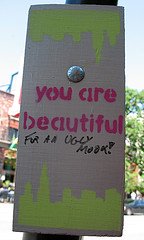|
Learned Ugliness
We've all known that girl (or guy, but usually it's a girl) who looks perfectly fine. Maybe she's cute, or even stunning. Yet she insists, in the face of all evidence, that she's hideously ugly. Perhaps you are this person. I call this phenomenon "learned ugliness." Like learned helplessness, some people learn, through other people, airbrushed billboards, television, internet comments ("ScarJo is a butterface!") and so on, that they aren't attractive enough to be loved. They look in the mirror and see a fat monster; they look at themselves and grow disgusted. This is also called "ugly duckling syndrome," where someone grows into their looks later in life, but has still internalized that low self esteem from being fat/acne prone/weak when they were a child. Of course, some people really are ugly. This is not a fatal shortcoming, but it is a shortcoming, especially in a competitive, lookist society. Nobody treats a stranger based on how beautiful they are inside. Your appearance plays a crucial role in how other people judge you, and some of your appearance can't be helped. But for many people, learned ugliness is a defense mechanism. Whatever they really look like, learned ugliness shields them from the world's judgment. If you accept that you're ugly, you no longer have to worry about looking your best, since your best is never good enough. If you like someone romantically, you don't have to approach them, since you'd be rejected anyway. Learned ugliness gives you permission to let areas of your life wither and die on the vine. If sexuality, friendships, meeting new people, eating right, taking care of your body, or other parts of your life only bring you frustration and despair, why not give up and numb yourself from the pain? 
That doesn't mean apathy is painless. In some extenuating circumstances (Auschwitz, sex slavery, an abusive upbringing) apathy may be necessary for survival. But one can't underestimate the psychological harm that comes from believing a depressing untruth. This is especially true when you push that belief out of your conscious mind into your subconscious, where it can really work its magic. Like Aldonza in "Man of LaMancha," a sincere compliment can be even more painful than a casual insult: You have shown me the sky, Does this describe you, in whole or in part? Chances are, your self-perceived ugliness is actually a symptom of some larger problem. These problems––a lack of self confidence, a disbelief in your talent, fear of failure or success––can affect every area of your life, whether you look like Elizabeth Taylor or Eleanor Roosevelt. SolutionsOne solution to learned ugliness is learned gorgeousness. This largely consists of saying (or writing) positive affirmations like "I am beautiful" or "I am a sexy bitch." I don't think too much of this approach. On a purely practical front, it's unlikely to stick. Beautiful people are treated differently from average, ugly or even cute people; if you repeat these affirmations and people still look through you on the street, reality will probably win out. You also don't unlearn ugliness this way; it does nothing to address any underlying problems you might have. If your room is full of fashion magazines, getting rid of them will do more for your esteem than saying "I am sexy" 100 times in front of the mirror. Another approach is deciding that everyone is beautiful and worthy of love, including you. This forces you to be aware of the people around you. What makes that middle-aged bag lady beautiful? What about that fat guy who looks like Homer Simpson? How you answer these questions says more about you than them. At the very least, it will make life more interesting. What's making you feel ugly now? Were you teased as a little kid? Are your friends obsessed with their own looks, or ugliness? Figure it out, but don't obsess about it. Instead, decide to make a change in your self image, even if you're not sure how you'll do it, even if you're not sure if change is for the best. If you really are unattractive, and it's not your imagination, realize that your unattractiveness doesn't condemn you to being a bad or even unhappy person. It doesn't make you unworthy of love. Bette Davis, Kurt Cobain, Edie Sedgwick, Muriel Hemingway, River Phoenix, were all quite beautiful, but their looks didn't lead to happiness. If all else fails, find and remove the influences in your life that make you feel ugly. If you have a friend who always criticizes other people's looks, stop hanging out with that friend. If none of your friends have any luck with the opposite sex, find some new friends. Stop watching tv shows or surfing internet forums with so many negative comments. Refuse to be associated with them; hold yourself to higher standards. Yes, you're allowed. After all, aren't you a sexy bitch? Related Reading: 30 Ways to Clean Out Your Closet Learned Ugliness is part of our Style and... essay section. Return to Enjoy Your Style's home page. Search Enjoy Your Style: |
Search this site:





